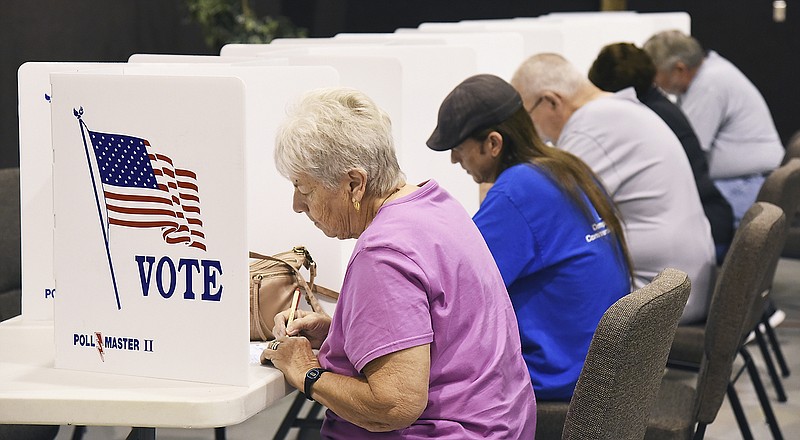Jefferson City soundly rejected a use tax at the polls Tuesday.
By a 58 percent vote, Jefferson City residents rejected Proposition L, a proposed 2 percent use tax on all out-of-state items to be used, stored or consumed in Jefferson City. The issue failed in 15 precincts in Jefferson City, with 6,139 people voting against it. Over 4,300 people voted in favor of the use tax (41.63 percent).
The issue failed in three precincts in Callaway County - four votes (80 percent) to one vote (20 percent).
Jefferson City resident Mary McGraw voted against the use tax Tuesday. She said there currently are too many taxes and the city should not push more at this time.
"My impression of what's going on is that we voted for the new school and they're going, 'Oh, hey, they're going to vote for new stuff, new taxes,'" she said. "The new school is enough. We all had our property taxes increased. But I think they were like, 'Oh yeah, we can get all of these new taxes in.' No, no, that's a big one. That's a lot of money. That's enough."
In April 2017, voters approved funding a $130 million bond issue to build the new Capital City High School and renovate the existing Jefferson City High School.
Having pushed residents to vote "yes" on the use tax for the last month, Gary Wilbers with campaign organization Citizens for a Stronger Community said he was disappointed. The organization plans to survey people and learn how it could have bettered its campaign.
It is unclear if the city or organization will propose a use tax again for a future ballot, Wilbers added.
"We're going to have to go back to the drawing board," he said. "I thought we tried to put it out there in a clear, concise manner. But it's one of those issues that is not easily clear and concise. I think that's something we'll really have to decide if we can get the voters to understand because it's more than just about a tax increase. It's about what we're doing to help our retailers and help our community. It's an issue that's not going away because the internet is not going away."
Wilbers, city officials and some business owners said they thought a use tax would "level the playing field" and help local businesses compete with online stores that don't have a presence in Jefferson City. When a buyer purchases products online from an out-of-state vendor, the buyer does not pay sales tax to Jefferson City; when those same items are bought in the city, a sales tax is added.
Clayton and Barbara Hill said they thought the city did not provide valid reasons to implement a use tax, adding they thought it would not have benefitted Jefferson City residents.
"I don't think the level the playing field is any valid reason to pass it," Clayton Hill said. "More so, I don't think Jefferson City has ever demonstrated the need for more taxes, and the taxes that would have been gained by this issue were never specifically demonstrated as to what they would have used this tax for. We don't know what services Jefferson City is not providing with existing sales tax. To add taxes, to me, is not valid."
If it had been approved, residents would not have paid both taxes for the same purchase; they would have paid either a sales tax or a use tax.
Boone County and Columbia voters rejected a use tax proposal last year. Fulton and Wardsville voters turned down similar ballot measures in April.
Missouri has a 4.225 percent use tax.
More than 160 Missouri cities and municipalities also have use taxes, according to the Missouri Municipal League. This includes Cole County, Callaway County, Linn and Sunrise Beach.
Jefferson City officials began pushing a use tax last year after the Missouri Supreme Court ruled in 2012 that cities could collect sales tax on out-of-state motor vehicle purchases only if those cities have local use taxes. This meant Jefferson City had to either receive voter approval to continue the sales tax on out-of-state motor vehicle purchases or pass a use tax.
Originally, city officials felt a time crunch to place a use tax initiative on the ballot due to a Nov. 1 deadline, but the General Assembly passed a bill earlier this year that pushed that deadline to November 2022.
If Jefferson City does neither, Jefferson City Finance Director Margie Mueller said previously, it could lose $240,000 each year from the out-of-state vehicle purchase tax.
If a use tax were implemented, the city could have received about $1.5 million in additional revenue, Mueller said previously.
The U.S. Supreme Court ruled in June that states may collect sales taxes from businesses that do not have physical locations in those states.

